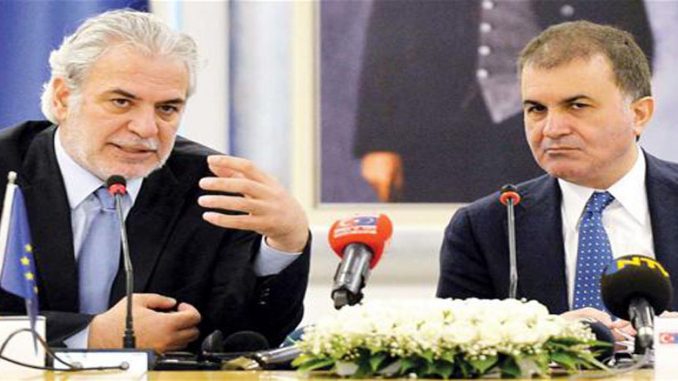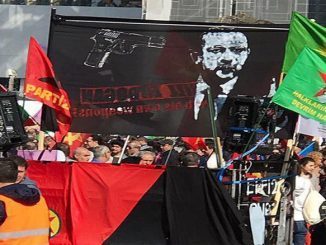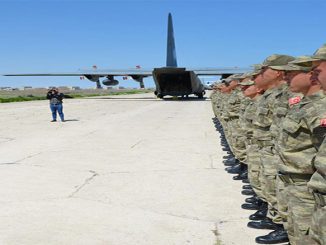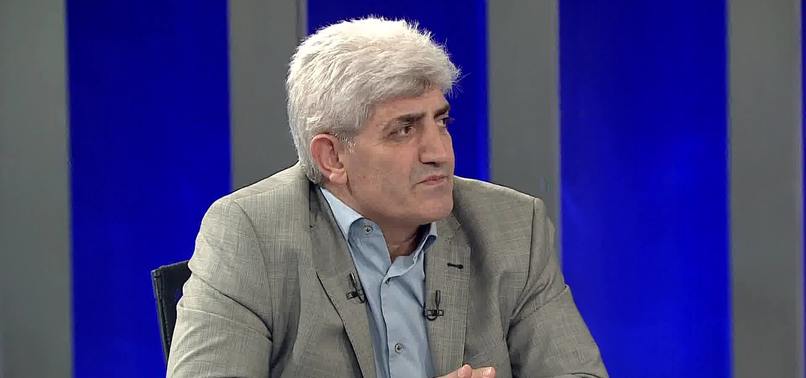
Officials from Turkey and the European Union will meet June 13 in Brussels for a political dialogue meeting to review the current status of issues on their mutual agenda and to discuss ways of moving forward after a period of tension.
The discussions will set the stage for higher-level gatherings at the ministerial level for political, energy, and economy dialogue meetings.
EU Ministry Undersecretary Selim Yenel and Foreign Ministry Deputy Undersecretary Mehmet Kemal Bozay will represent Turkey at the political directors meeting where the current status of possible upgrades to the customs union, the migrant deal between Ankara and Brussels, visa liberalization for Turks to the Schengen area, the fight against terrorism, as well as future meetings for high-level dialogue on political, energy and economic relations will be studied.
Ankara expects to discuss visa liberalization for Turkish citizens to Europe, but the EU has made it clear that there are 72 criteria for the finalization of the agreement. Ankara has failed to meet five of the remaining benchmarks. Turkey has fulfilled the majority of the remaining criteria, but Brussels has demanded that the Turkish government revise the law on combatting terrorism in accordance with the EU regulations.
The regulations expected to be fulfilled by Turkey for visa liberalization are as follows: the signature of an operational cooperation agreement with Europol, the signing of a legal cooperation agreement with EU member countries, the preparation of third-generation passports, the review of the law on the protection of personal data and the revisal of anti-terrorism legislation.
Visa liberalization is part of a migrant agreement signed in 2016 between Turkey and the EU, in which Ankara agreed to take back all Syrians who crossed to the Greek islands illegally from Turkey, while the EU promised to take in the same number of Syrian refugees from Turkey.
The migrant deal planned to stop illegal migration via the Aegean Sea by cracking down on human traffickers and improve the conditions of nearly 3 million Syrian refugees in Turkey, but became a source of tension between the bloc and Ankara, as the latter criticized Brussels for failing to deliver the humanitarian funds promptly.
Turkey has asked the EU to speed up the flow of funds for refugees and to accept more migrants.
Officials will also discuss the current status of talks to upgrade a Customs Union agreement on industrial goods by expanding it to agricultural products, services and public procurements. The European Commission notified the European Council that it was ready to negotiate with Turkey and called for a mandate in late 2016.
Ankara has demanded the opening of accession chapters 23 and 24, related to the rule of law and fundamental rights, as part of accession talks, but Brussels has been reluctant to move the talks further due to the concerns of some member countries regarding the state of fundamental rights in the country.
“The criteria are very clear and well-known, and if Turkey is interested in joining, as the foreign minister told us today … it knows very well what that implies, especially in the field of human rights, rule of law, democracy and freedoms,” EU foreign affairs chief Federica Mogherini stated at a Malta meeting in April where the majority of bloc members decided to maintain dialogue with Turkey in reply to some calls to halt the accession talks.
Relations between Ankara and Brussels were especially strained after the July 2016 coup attempt and the political spat between EU and Turkish leadership have toned down after the April 16 referendum for a constitutional amendment in Turkey.
Ankara has criticized the bloc’s stance against the activities of the outlawed Kurdistan Workers’ Party (PKK) in EU cities and their position against the Fethullahist Terror Organization (FETÖ) members, blaming them for not showing timely support to Turkey after the coup attempt.
The rigidity eased after a May 25 meeting, which brought together Turkish President Recep Tayyip Erdoğan, European Commission head Jean-Claude Juncker, and European Council President Donald Tusk, where the parties agreed to work on a positive agenda.



